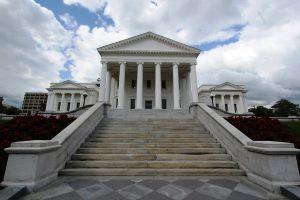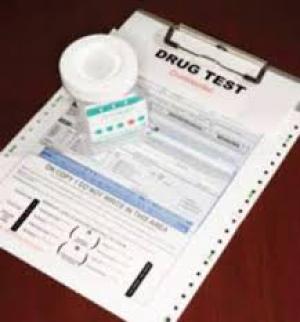Things aren't as clear cut as they may seem.
A medical marijuana bill advances in Alabama, South Dakota lawmakers vote to delay the implementation of voter-approved medical marijuana, and more.
Asset forfeiture reform is moving in Arizona, the Connecticut governor's marijuana legalization bill gets a hearing, the Nevada legislature looks at ending the federal ban on food stamps for drug offenders, and more.
New Mexico lawmakers work to shrink four marijuana legalization bills down to one, Pennsylvania's governor pardons dozens more marijuana offenders, and more.
The DEA points to Mexican drug cartels as the nation's greatest criminal drug threat, senators in Washington state move to reinstate the state's invalidated felony drug possession law, Dallas police are pushing to stop making small-time pot possession arrests, and more.
Last Saturday, the Virginia House and Senate approved a pair of bills to legalize marijuana -- but not for three years and with significant portions of the package required to be approved again next year, which could prove difficult if Democrats lose control of the legislature. The bills now go to the desk of Gov. Ralph Northam, who has previously voiced support for marijuana legalization, but some unhappy advocates are calling on him to amend them to address what they see as serious failings.

Virginia House chamber
The bills,
SB 1406 HB 2312 would legalize the possession of up to an ounce of marijuana and tax and regulate legal marijuana commerce beginning on July 1, 2024. They also allow for the home cultivation of up to four plants, two mature and two immature. And they mandate the shielding of records for past marijuana convictions from employers, landlords, insurance companies, and educational institutions.
But according to a bill summary from the Marijuana Policy Project (MPP), the bills also create new criminal offenses for public consumption ($25 fine), minor in possession ($25 fine and substance abuse education program), possession on school grounds (up to six months in jail), consumption in a moving motor vehicle (fine-only misdemeanor), and importing marijuana into the state (up to a year in jail). In addition, while possession of more than an ounce but less than a pound would be a $25 fine, possession of more than a pound can earn up to 10 years in prison.
The bills attempts to redress racial inequities and discrimination by providing licenses preferences and fee waivers to "social equity applicants," which MPP describes as "having 66% or more owners who: have a prior cannabis conviction, have a close relative with a cannabis conviction, live either in an area with disproportionate cannabis arrests or that is economically distressed, or graduated from a Virginia HBCU." The bills also create a Cannabis Equity Reinvestment Fund to help people and communities disparately harmed by pot prohibition and Cannabis Business Equity and Diversity Support Team to encourage minority involvement and develop criteria for plans to emphasize diversity, equity, and inclusion.
"It was a lot of work to get there, but we're on the path to an equitable law allowing for responsible adults to not be penalized for using cannabis," cosponsor Sen. Adam Ebbin (D-Alexandria) said after the vote.
"Virginia legislators are proving that it is possible to work swiftly to pass legislation that would not only legalize cannabis, but also address the disproportionate harm caused by decades of prohibition," MPP executive director Steve Hawkins," said in a press release lauding the vote. "Virginia is on the brink of becoming the 16th state to end cannabis prohibition and replace it with sensible legalization and regulation for adults 21 and over. MPP is proud to have played an important role in all three states where legislatures have voted to legalize cannabis -- Vermont, Illinois, and now, Virginia."
The National Organization for the Reform of Marijuana Laws (NORML) also pronounced itself pleased.
"The advancement of this legislation is another historic step for cannabis justice in Virginia," NORML Development Director and Virginia NORML executive director Michelle Pedini said in a statement greeting the vote. "Stakeholders, the administration, and the legislature have dedicated hundreds of hours to craft legislation that is just and equitable, and that will replace the failed policy of cannabis prohibition with one that promotes Virginia’s economy as well as Virginians' public health and safety."
But the marijuana consumers' group also signaled that it didn't consider the legislation perfect.
"This effort remains a work in progress and our efforts in Virginia are far from over," Pedini noted. "NORML is dedicated to continuing our work with lawmakers and regulators to advance legislative reforms that are most closely aligned with the views of the majority of Virginians who desire a safe, legal cannabis market. In particular, we hope to expedite the timeline with which Virginia adults will no longer face either criminal or civil penalties for the personal possession and cultivation of cannabis."
But some Democratic legislators were less than satisfied.
"The final bill, as we saw it, did not have really have the criminal justice reforms as quickly as we would like them to be," said Delegate Sam Rasoul (D-Roanoke). "We also want to make sure we do everything we can from a safety perspective, from an educational perspective."
"Let us be clear, this bill is not legalization and there are a lot of steps between here and legalization," said Sen. Jennifer McClellan (D-Richmond) during Saturday's floor debate. "It's not worse than the status quo. Could it be better, yes."
Some other interested parties, though, including the ACLU of Virginia, Justice Forward Virginia, Marijuana Justice, and RISE for Youth, were not so sure the final package was an improvement. The activist groups had laid out their position -- end marijuana prohibition now, don't criminalize youth, strong expungement, racial justice -- in a February 9 open letter to the administration and legislators, and they unhappily reiterated their commitment to that position after the vote.
In a statement the same day, the ACLU of Virginia blasted the final result as "worse than the status quo" in terms of racial justice. "The bill creates new crimes that include permitting searches for having marijuana in a vehicle and possession under the age of 21," the group charged. "The bill also adds new pretexts like 'transportation' and offering or consuming marijuana in a public place, all of which will be enforced disproportionately against Black Virginians."
The ACLU of Virginia called the legislation little more than "an aspirational policy statement" given that many aspects of it will have to be voted on again next. Its bottom line was blunt: "This bill does not advance the cause of equal justice or racial justice in Virginia. It is the product of a closed-door legislative process that has prioritized the interests of recreational marijuana smokers over people and communities of color. The bill is a failure."
It's now up to Gov. Northam to sign or veto the legislation, or amend it and send it back to the legislature for changes to be considered. Virginia has legalized marijuana, but that battle over what that really means is still underay and undoubtedly just beginning.
back to top
A medical marijuana bill advances in Alabama, South Dakota lawmakers vote to delay the implementation of voter-approved medical marijuana, and more.
AlabamaAlabama Senate Approves Medical Marijuana Bill. The state Senate approved a medical marijuana bill, SB 46, last Wednesday and sent it to the House for approval there. The bill would allow patients with specified medical conditions to receive marijuana with a physician's approval.
Florida
Florida Bills Aim to Restrict Medical Marijuana. Rep. Spencer Roach (D-North Fort Myers) and Sen. Ray Rodrigues (R-Estero) have filed companion bills, HB 1455 and SB 1958, respectively, that would place a 10% THC cap on smokable marijuana and limit THC levels to 16% in other, non-edible medical marijuana products. The bills would also impose advertising restrictions on doctors who recommend medical marijuana. They are being fiercely criticized by medical marijuana advocates, one of whom said the bills continue "to encroach on the practice of medicine between a physician and their patients using outdated, random and scientifically unsubstantiated information."
Missouri
Missouri Bill Would Protect Patients' Privacy, Gun Rights. Rep. Nick Schroer (R-O'Fallon) has filed HB 501, which would make disclosing patient information to the federal government a criminal offense. "I just want to make sure that we're protecting our Second Amendment rights and law abiding citizens who may have medical marijuana, but then they also have a weapon in their house to defend their family when necessary," Schroer said during his testimony on the bill in committee Wednesday. While the measure won support on the committee, no vote was taken.
South Dakota
South Dakota House Approves Bill Delaying Implementation of Medical Marijuana Legalization. The House voted last Thursday to approve a bill delaying implementation of voter-approved medical marijuana, HB 1100. The bill was the brainchild of Gov. Kristi Noem (R), who sought a one-year delay, but the bill was amended in the House to create only a six-month delay "in the spirit of compromise."
back to top
Asset forfeiture reform is moving in Arizona, the Connecticut governor's marijuana legalization bill gets a hearing, the Nevada legislature looks at ending the federal ban on food stamps for drug offenders, and more.

arrest-image_0_0_13.jpg
Connecticut Marijuana Legalization Bill Gets Hearing, Police Chiefs Oppose. The Judiciary Committee is holding a hearing on a marijuana legalization bill supported by Gov. Ned Lamont (D), SB 888. At the same time, the Connecticut Police Chiefs Association is formally opposing the bill, saying it is worried legalization would make the highways less safe and invoking the opioid crisis.
Montana Lawmakers Consider Tightening Limits on Legal Marijuana. The House Business and Labor Committee on Wednesday heard testimony of HB 568, which would impose numerical and distance restrictions on legal marijuana businesses. The bill would cap the number of adult sales stores to one per 10,000 residents, with only one shop in counties with fewer than 10,000 residents. The bill would also require pot shops to be 1,000 feet away from places of worship, schools, preschools, day care facilities, parks, recreational facilities and playgrounds. The committee took no action on Wednesday.
South Dakota Lawmakers Advance Marijuana Banking Bill. The Senate Commerce and Energy Committee voted Thursday to approve HB 1203, which would let state-chartered banks do business with legal marijuana and industrial hemp businesses. The bill has already passed the House and now heads for a Senate floor vote.
Virginia House, Senate Seek Compromise on Marijuana Legalization as Saturday Deadline Looms. Legislators have about 24 hours to come to agreement on competing marijuana legalization bills passed by the House and Senate before a Saturday deadline. It looks like lawmakers will go with the House on timing, agreeing to defer legalization until January 1, 2024, while the Senate bill called for legalization on July 1. The two chambers remain split, though, on whether five current medical marijuana operators will be allowed to sell recreational weed. The House opposes such vertical integration, but the Senate would allow it if the operators pay $1 million into a Cannabis Equity Business Fund. The clock is ticking.
Medical Marijuana
South Dakota House Approves Bill Delaying Implementation of Medical Marijuana Legalization. The House voted to approve a bill delaying implementation of voter-approved medical marijuana, HB 1100. The bill was the brainchild of Gov. Kristi Noem (R), who sought a one-year delay, but the bill was amended in the House to create only a six-month delay "in the spirit of compromise."
Asset Forfeiture
Arizona House Passes Bill to End Civil Asset Forfeiture. The House on Wednesday approved a bill to end civil asset forfeiture in the state, HB 2810, which would require that the state actually convict somebody of a crime before seizing their property. The bill now heads to the Senate.
Drug Policy
Nevada Lawmakers Take Up Bill to End Food Stamp Ban for Drug Offenders. The Assembly is considering a bill that would let the state opt out of a federal 1996 "welfare reform" that banned people convicted of drug offenses from being able to receive assistance such as food stamps. AB 138, which was heard Wednesday, removes the prohibition. The bill would have originally required persons to show they were not "currently possessing, using or distributing controlled substance," but Assemblywoman Susie Martinez (D-Las Vegas), the primary sponsor for the legislation, eliminated that section. No vote was taken.
Washington Supreme Court Strikes Down Strikes Down State's Drug Possession Law. The state Supreme Court on Thursday throw out the state's felony drug possession law because it did not mandate that prosecutors prove that someone knowingly or intentionally possessed drugs. The ruling came in the case of a Spokane woman who was given a pair of jeans that had a small bag of meth in one pocket. "Attaching the harsh penalties of felony conviction, lengthy imprisonment, stigma, and the many collateral consequences that accompany every felony drug conviction to entirely innocent and passive conduct exceeds the legislature's powers, Chief Justice Sheryl Gordon McCloud wrote for the majority.
back to top
New Mexico lawmakers work to shrink four marijuana legalization bills down to one, Pennsylvania's governor pardons dozens more marijuana offenders, and more.

Virginia State House (Creative Commons)
. The Senate Tax, Business and Transportation Committee on Saturday asked the sponsors of four competing marijuana legalization bills to get together this week and come up with one bill for the committee to consider and vote on this coming Saturday. That would leave legislators with just two weeks to get to a Senate floor vote before the session ends on March 20.
Pennsylvania Governor Grants 69 More Marijuana Pardons. Gov. Tom Wolf (D) on Monday announced that he had granted expedited pardons to 69 low-level marijuana offenders, bring his total of pot pardons to 95. He also pardoned another 241 non-marijuana offenders. The move comes as Wolf calls for marijuana legalization and as a bipartisan bill is now before the legislature.
Virginia Lawmakers Approve Marijuana Legalization… Three Years from Now. The House and Senate reached a deal on marijuana legalization Saturday, but in an attenuated way. The measure would not actually legalize marijuana until 2024 and would require the legislature to vote on parts of the bill again next year, both positions that have legalization advocates complaining loudly. The need for additional votes next year exposes legalization to the chance it could depend on Republican majorities in the House and/or Senate or a new Republican governor who would not be as supportive. The bill now goes to Gov. Ralph Northam (D), who supports legalization, and now some Democrats are calling on him to amend the bill and send a more complete measure to the statehouse later this year.
Washington, DC, Mayor Filed Bill to Legalize Marijuana Sales. DC Mayor Muriel Bowser (D) announced Friday that she had filed a bill to legalize pot shops in the nation's capital. DC voters approved marijuana legalization in 2014, but have been blocked from setting up a legal, regulated system of marijuana commerce because federal budget provisions bar the District from using funds to regulate and tax still federally illegal marijuana. With Democrats in control of Congress now, advocates that budget rider will now be killed, clearing the way for legal sales. The measure is B24-0114, the Safe Cannabis Sales Act of 2021.
Sentencing Policy
Virginia Legislative Bid to End Mandatory Minimum Sentences Dies. Although both chambers passed bills doing away with mandatory minimum sentencing --HB 2331to end mandatory minimums for drug offenses and SB 1443to end them for all offenses -- House and Senate negotiators failed to reach a compromise, and the bills died as the session ended Saturday.
International
Colombia Launches New Elite Military Unit to Target Coca Crops, Drug Trafficking, Armed Groups. The Colombian government announced last Friday it had launched a new, elite military unit to heighten the fight against coca cultivation, drug trafficking, and the armed groups who benefit from prohibited activities. "The unit was born to hit, repress, and break down the structures of drug trafficking and transnational threats linked to illegal mining, the trafficking of wildlife and people, and -- of course -- any transnational form of terrorism," President Ivan Duque said. The new unit of some 7,000 soldiers will be deployed to Catatumbo region bordering Venezuela and the coca-producing provinces of Cauca and Putamayo.
back to top
The DEA points to Mexican drug cartels as the nation's greatest criminal drug threat, senators in Washington state move to reinstate the state's invalidated felony drug possession law, Dallas police are pushing to stop making small-time pot possession arrests, and more.

A California bill would end almost all marijuana drug testing for employees. (Creative Commons)
California Bill Would End Most Workplace Marijuana Drug Tests. Assemblyman Bill Quirk (D-Hollywood) has introduced AB 1256, which would bar employers from using past evidence of marijuana use, such as hair or urine tests, to discriminate against employees. The bill is supported by CA NORML. "It is those tests that we want to ban, because they don't detect anything related to impairment," the group's longtime director Dale Gieringer said. The tests can show whether someone has used marijuana in the past, but not whether they are currently intoxicated.
Dallas Police Push No Arrests for Marijuana Possession Up to Two Ounces. Dallas Police are proposing to the city council Tuesday that it adopt a policy of no longer ticketing or arresting people caught with less than two ounces of marijuana. Pot busts accounted for 7% of all arrests in the city during the first three weeks of February, and 80% of those pot arrets were for fewer than two ounces. The proposal goes before the council's Public Safety Committee on Tuesday.
Harm Reduction
Rhode Island Senate Approves Bill Allowing Safe Consumption Sites for Illegal Drugs. The state Senate last week quietly approved SB 0016, which would authorize the creation of "Harm Reduction Centers" where drug users could inject drug under medical supervision. The bill would create an advisory committee to make recommendations to the state Health Department on regulating safe injection sites. A companion bill, HB 5245, though, is stuck in the House Committee on Health and Human Services, which has not set a date to vote on it.
Drug Policy
Washington State Senators Bill File to Bring Back Drug Possession Felony Crimes. Just days after the state Supreme Court threw out Washington's felony drug possession law, a pair of Democratic state senators, Mark Mullet and Steve Hobbs, have filed legislation to make possession of a controlled substance a felony again, SB 5468. The court threw out the law because it did not require prosecutors to prove that someone "knowingly" possessed drugs; this bill would merely add "knowingly" to the statute.
Law Enforcement
DEA Releases 2020 National Drug Threat Assessment. The DEA released its annual National Drug Threat Assessment Tuesday. The agency said that "the opioid threat remains at epidemic levels, affecting large portions of the country. Meanwhile, the stimulant threat, including methamphetamine and cocaine, is worsening both in volume and reach, with traffickers selling increasing amounts outside of traditional markets." DEA also pointed the finger at Mexican "transnational criminal organizations" as "the greatest criminal drug threat in the United States."
Washington House Approves Bill to Ban Chokeholds, No-Knock Warrants. The House on Saturday approved HB 1054, which would ban police from using chokeholds and using no-knock search warrants. The bill is now being considered by the Senate Law and Justice Committee.
back to top




